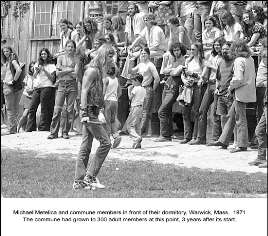Friday, June 01, 2007
Living in the shadow of a dream
FREE SPIRITS: THE BIRTH, LIFE & LOSS OF A NEW-AGE DREAM
Produced, written and directed by Bruce Geisler
(DVD, available from www.acornproductions.net)

Michael Metelica and commune members outside the group’s dormitory in Warwick in 1971.
For many of us, the 1960s still evokes patchouli-scented memories of a different era, a time of optimism and idealism. Things were going to be different; we were going to change the world. It may have been naive to assume that the rest of the world would sign on to this extreme makeover of Western civilization, yet there is still an endearing quality to the dreamy aspirations of the Sixties.
Bruce Geisler has captured the sights, sounds and sensations of the era, along with its hopes and disappointments, in his documentary, “Free Spirits: The Birth, Life & Loss of a New-Age Dream,” which is now available on DVD. The movie tells the story of a commune - first known as the Brotherhood of the Spirit, and later as the Renaissance Community - that sprouted in western Massachusetts and gained national attention. Geisler, who teaches film production and screenwriting at the University of Massachusetts, lived at the commune for parts of four years in the 1970s.
Geisler has produced a vivid picture of the commune’s rise and fall. The story revolves around the commune’s leader, Michael Metelica, who became enamored of 1967’s Summer of Love while living in California. He returned to Massachusetts in 1968, retreating to a treehouse he built in Leyden where he eventually came up with the idea of starting the Brotherhood of the Spirit commune.
The group was remarkably industrious and self-sufficient, purchasing land, developing housing for commune members, and starting businesses. Early on, Metelica relied on confrontational techniques as character-building exercises for the commune’s members; as years passed, disenchantment set in as Metelica became increasingly autocratic. He also began investing most of his energy in his band, Spirit in Flesh, and while expecting commune members to live in spartan fashion, he spent lavishly on himself.
The group fractured even further as Metelica struggled with drug and alcohol addiction. He was forced off the commune in 1988, marking the start of the community’s dissolution.
Before his death from colon cancer in 2003, Metelica reflected on his communal experiment in filmed interviews. In some of the documentary’s most powerful moments, Geisler offers a compelling portrait of Metelica as a tormented man who can’t completely come to grips with his own role in the disintegration of the commune. One senses that a dream has inexplicably slipped away - a feeling not unlike that gnawing nostalgia for the Sixties.
— Alan Lecker
« go back